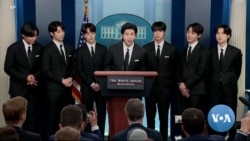The U.S. Secretary of State outlines the Biden administration’s China policy.
Hello and welcome to VOA Asia Weekly. I'm Chris Casquejo in Washington. That story coming up.
But first, making headlines across Asia.
China’s largest city, Shanghai, began to fully return to normal after a strict two-month COVID lockdown expired.
The Chinese Foreign Minister visited Vanuatu on his regional island-hopping tour after failing to sign an ambitious deal with 10 South Pacific nations.
U.N. Secretary-General Antonio Guterres said it was impossible to have a clear picture of everything going on in Xinjiang regarding Muslim Uyghurs after the U.N. Human Rights Chief visited last week.
Hong Kong’s next leader, John Lee, received an official letter of appointment from Beijing a month before he takes over the city’s leadership.
Search and rescue teams in Nepal recovered the remaining bodies of the 22 victims and the flight data recorder from a plane that crashed in the Himalayas.
Passenger train service resumed between India and Bangladesh after a two-year COVID hiatus.
The U.S. is planning on "cooperation" between its National Guard and Taiwan's military, Taiwan President Tsai Ing-wen said.
Tsai met with U.S. Senator Tammy Duckworth, noting that Duckworth was one of the main sponsors of the Taiwan Partnership Act, which had received bipartisan support in the U.S. Congress, but has yet to become law.
In a highly anticipated speech, U.S. Secretary of State Antony Blinken outlined how the Biden administration is approaching relations with China. VOA’s Anita Powell reports.
Secretary of State Antony Blinken says the U.S. policy toward China comes down to three words: invest, align and compete.
“We will invest in the foundations of our strength here at home — our competitiveness, our innovation, our democracy. We will align our efforts with our network of allies and partners acting with common purpose and in common cause, and harnessing these two key assets, we’ll compete with China to defend our interests and build our vision for the future.”
Blinken said that Washington was not seeking conflict with Beijing, and that the United States was committed to defending international law and institutions that he said China wanted to move away from.
“Under President Xi (Jinping), the ruling Chinese Communist Party has become more repressive at home and more aggressive abroad. We see that in how Beijing has perfected mass surveillance within China and exported that technology to more than 80 countries. How it's advancing unlawful maritime claims in the South China Sea, undermining peace and security, freedom of navigation and commerce.”
Blinken stressed that the U.S. also remains focused on Beijing’s human rights abuses.
“Its treatment of ethnic and religious minorities in Xinjiang and Tibet, along with many other actions, go against the core tenets of the U.N. Charter that Beijing constantly cites, and the Universal Declaration of Human Rights that all countries are meant to adhere to. Beijing's quashing of freedom in Hong Kong violates its handover commitments enshrined in a treaty deposited at the United Nations.”
President Joe Biden had said the U.S. was willing to use its military to defend Taiwan, which would have been a shift from the U.S. policy of “strategic ambiguity” in which officials have stopped short of such making such pledges. Blinken said U.S. policy remained the same.
“And Beijing is engaged in increasingly provocative rhetoric and activity like flying PLA aircraft near Taiwan on an almost daily basis. These words and actions are deeply destabilizing; they risk miscalculation and threaten the peace and stability of the Taiwan Strait.”
The secretary of state noted the U.S. does not want to “decouple” from China; instead, it wants to continue trade and investment with the Asian superpower as long it’s “fair and does not jeopardize” U.S. national security.
Anita Powell, VOA News, the White House.
Visit our website voanews.com for the most up-to-date news. This is VOA Asia Weekly.
U.S. President Joe Biden hosted K-pop supergroup BTS to raise awareness of anti-Asian discrimination.
Members did not answer reporters’ questions at the White House about what policy changes they proposed to President Biden.
The group has faced criticism in its home country South Korea for not speaking out against North Korea.
Finally on VOA Asia Weekly, a ban on chicken exports went into effect this week in Malaysia.
Malaysia’s government says the move is due to rising prices of chicken feed. Highly urbanized southern neighbor Singapore gets more than a third of its chicken from Malaysia. So now owners of chicken rice stalls in Singapore worry about the prospects for their businesses.
Thanks for watching VOA Asia Weekly. I’m Chris Casquejo. See you next week.











